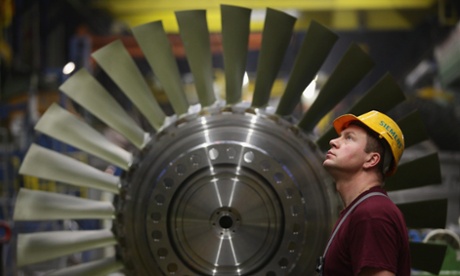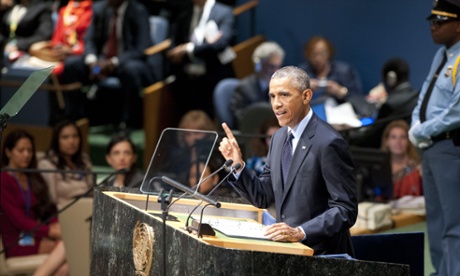One of the world’s leading industrial multinationals has said it will be investing in fossil fuels for “the really long-term”, despite commitments to green technologies including renewable energy and energy efficiency.
The declaration by Siemens, made on the fringes of Climate Week in New York, highlights the competing imperatives of fossil fuel investment and decarbonisation efforts, and comes even as investors announced $200bn (£123bn) for clean technology as one of the key achievements of the week.
On Tuesday, at the UN secretary general’s summit of world leaders, Barack Obama, David Cameron and others renewed their pledges to tackle climate change.
But Roland Busch, chief executive of the infrastructure group at Siemens, the German-based industrialist, said any idea of pulling out of fossil fuels was “really long-term”. The group has strong interests in renewable sources of energy, including wind turbine manufacturing, as well as fossil fuel-burning technology.
He pointed to the company’s home market. “You can run Germany on renewable energy on a sunny day when the wind is blowing, but you will still need coal [on other days]. A lot of countries are still burning coal.”
For Siemens, he said, being green was also about ensuring carbon fuels were burned more efficiently, saving emissions while continuing to generate energy. “Regardless of how much you push [renewable energy] in the next years you will still have a certain share of energy coming from fossil fuels. We are trying to make that more efficient, more low-carbon, with our technologies,” he said.
The company is investing in carbon capture and storage technology, with pilot plants in the US and China, and in gas, which generates less carbon when burned than coal. But coal would still be an important part of the company’s future, Busch said. “You need coal, at least to some extent.”
“In the next ten to 20 years I can’t imagine running any economies without fossil fuel,” he added. “Beyond 20 years, it’s very hard to say.”
His words reflected the dilemma businesses face, of investing in green technology, fossil fuels, or trying to do both.
Connie Hedegaard, the outgoing European commission climate chief, also at the summit, said: “Some businesses are really doing a lot and I applaud them as much as I can. But there is still a big bulk of business that is conducting business as usual. So in the business community they have a huge challenge in front of them to scale up and make it [green investment] mainstream. The business community still has a lot of work to do, to make it trickle down to the big bulk of business out there in the big, big world.”
Geoff Morrell, the US spokesman for BP, also made it clear that fossil fuel businesses see a long-term future in carbon-intensive fuels despite efforts to tackle global warming. The former long-running chief executive of BP, Lord Browne, spearheaded an initiative in the early years of this century to refocus BP on the threat of climate change, and created the new label for the company as “Beyond Petroleum”, a tag that was swiftly dropped when he departed.
“We are probably more of an oil company today than we were [when Lord Browne ran the company until 2007],” Morrell said, adding that Browne had received “a lot of scorn from our colleagues” for his acceptance of climate science. But he insisted: “We still do have very large investments in alternative energy, $70m in the last eight years. I think that’s probably bigger than any other major.”
But he added: “I must be frank with you: it has been very, very hard for us to make money in that [renewable energy] space. Our solar business we tried for 40 years to make solar work, and at the end of the day we just couldn’t make money at it. About a year or two ago, we got out of it. But we still do have a very big biofuels business, particularly in Brazil. We have a very big R&D programme in biofuels. We have 16 wind farms across the country. So we are trying, but I must tell you it’s a challenging environment to make money in.”
• Fiona Harvey’s travel to New York was paid for by Siemens, a sponsor of the C40 green awards for cities












